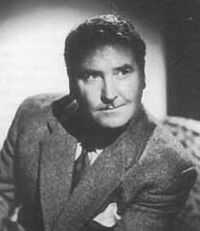Josef Locke

Josef Locke (23 March 1917 – 15 October 1999) was the stage name of Joseph McLaughlin, an Irish tenor. He was successful in the United Kingdom and Ireland in the 1940s and 1950s.
Background
Born in Derry, Ireland, he was the son of a butcher and cattle dealer, and one of nine children. He started singing in local churches in the Bogside at the age of seven, and as a teenager added two years to his age to enlist in the Irish Guards, later serving abroad with the Palestine Police Force, before returning in the late 1930s to join the Royal Ulster Constabulary.
Career
Known as The Singing Bobby, he became a local celebrity before starting to work the UK variety circuit, where he played 19 seasons in the northern English seaside resort of Blackpool. The renowned Irish tenor John McCormack (1884–1945) advised him that his voice was better suited to a lighter repertoire than the operatic one he had in mind, and urged him to find an agent—thus he found the noted impresario Jack Hylton (1892–1965) who booked him, but couldn't fit his full name on the bill, thus Joseph McLaughlin became Josef Locke.
He made his first radio broadcast in 1949, and subsequently appeared on TV programmes such as Rooftop Rendezvous, Top of the Town, All-star Bill and The Frankie Howerd Show. He was signed to the Columbia label in 1947, and his first releases were the two Italian songs "Santa Lucia" and "Come Back to Sorrento".
Success
In 1947, too, Locke released "Hear My Song, Violetta", which became forever associated with him. His other songs were mostly a mixture of ballads associated with Ireland such as "I'll Take You Home Again, Kathleen", "Dear Old Donegal", "Galway Bay", "The Isle of Innisfree" (the theme song from the film "The Quiet Man"), and another Dick Farrelly song, "The Rose of Slievenamon", excerpts from operettas including "The Drinking song" from The Student Prince, "My Heart and I" from Richard Tauber's operetta Old Chelsea, and "Goodbye" from The White Horse Inn, along with familiar favourites such as "Come Back to Sorrento" and "Cara Mia".
In 1948, he appeared in several movies produced by Mancunian Films, usually as versions of himself. He plays himself in the film Holidays with Pay. He also appears as "Sergeant Locke" in the 1949 comedy What a Carry On!.
In 1958, after he had appeared in five Royal Variety Performances, and while he was still at the peak of his career, the British tax authorities began to make substantial demands that Locke declined to meet. Eventually he fled the country for Ireland, where he lay low for several years. When his differences with the tax people were eventually settled, Locke retired to County Kildare, emerging for the occasional charity concert and reappearing in Blackpool in 1968. He later appeared on British and Irish television and in 1982 was given a lengthy tribute on Gay Byrne's The Late Late Show.
Hear my Song
.JPG)
In 1991, the Peter Chelsom film Hear My Song was released. It is a fantasy based on the notion of Locke returning from his Irish exile in the 1970s to complete an old love affair, and save a Liverpool-based Irish night-club from ruination. Locke is played by Ned Beatty.
The film led to a revival in Locke's career. A compilation CD was released and he appeared on This Is Your Life in March 1992.[1] He performed in front of The Prince and Princess of Wales at the 1992 Royal Variety Show, singing "Goodbye", the final song performed by his character in the film. He had announced prior to the song that this would be his final public appearance.
Memorial
On 22 March 2005, a bronze memorial to Locke was unveiled outside the City Hotel on Queen's Quay in Derry by Phil Coulter and John Hume. The memorial was designed by Terry Quigley. It takes the form of a spiraling scroll divided by lines, representing a musical stave. The spiral suggests the flowing melody of a song, and is punctuated by images illustrating episodes in his life, including Locke in police uniform, Blackpool Tower, Carnegie Hall, and the musical notes of the opening lines of "Hear My Song".
References
External links
|